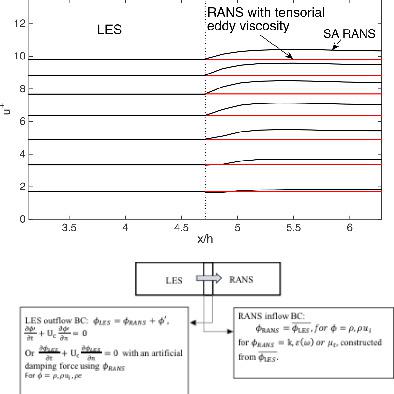当前位置:
X-MOL 学术
›
Int. J. Numer. Methods Fluids
›
论文详情
Our official English website, www.x-mol.net, welcomes your feedback! (Note: you will need to create a separate account there.)
Adaptive downstream tensorial eddy viscosity for hybrid large‐eddy simulations‐Reynolds‐averaged‐Navier–Stokes simulations
International Journal for Numerical Methods in Fluids ( IF 1.8 ) Pub Date : 2021-01-10 , DOI: 10.1002/fld.4954 Wanjia Zhang 1 , Tom I.‐P. Shih 1
International Journal for Numerical Methods in Fluids ( IF 1.8 ) Pub Date : 2021-01-10 , DOI: 10.1002/fld.4954 Wanjia Zhang 1 , Tom I.‐P. Shih 1
Affiliation

|
An adaptive method is developed to improve the accuracy of eddy‐viscosity Reynolds‐averaged‐Navier–Stokes (RANS) model in hybrid large‐eddy simulations (LES)‐RANS simulations by using available upstream LES results. The method first gets the tensorial eddy viscosity from the upstream LES solution at the LES‐RANS interface and then uses that information to improve the downstream RANS model by invoking the weak‐equilibrium assumption. The proposed method was evaluated via two test problems—flow in a channel and over a periodic hill. Results obtained show the proposed approach to increase the accuracy and stability of hybrid LES‐RANS simulations. Since the modification of the downstream RANS model is based on the tensorial eddy viscosity from the upstream LES solution, the method is adaptive to the problem being studied.
中文翻译:

混合大涡模拟-雷诺平均-Navier-Stokes模拟的自适应下游张量涡粘度
通过使用可用的上游LES结果,开发了一种自适应方法来提高混合大涡模拟(LES)-RANS模拟中涡粘性雷诺平均Navier-Stokes(RANS)模型的准确性。该方法首先在LES-RANS界面上从上游LES溶液中获得张涡粘度,然后使用该信息通过调用弱平衡假设来改善下游RANS模型。通过两个测试问题对提出的方法进行了评估-通道中的水流和周期性山丘上的水流。获得的结果表明,提出的方法可以提高混合LES‐RANS仿真的准确性和稳定性。由于下游RANS模型的修改基于上游LES解的张量涡粘度,因此该方法适用于正在研究的问题。
更新日期:2021-01-10
中文翻译:

混合大涡模拟-雷诺平均-Navier-Stokes模拟的自适应下游张量涡粘度
通过使用可用的上游LES结果,开发了一种自适应方法来提高混合大涡模拟(LES)-RANS模拟中涡粘性雷诺平均Navier-Stokes(RANS)模型的准确性。该方法首先在LES-RANS界面上从上游LES溶液中获得张涡粘度,然后使用该信息通过调用弱平衡假设来改善下游RANS模型。通过两个测试问题对提出的方法进行了评估-通道中的水流和周期性山丘上的水流。获得的结果表明,提出的方法可以提高混合LES‐RANS仿真的准确性和稳定性。由于下游RANS模型的修改基于上游LES解的张量涡粘度,因此该方法适用于正在研究的问题。



























 京公网安备 11010802027423号
京公网安备 11010802027423号